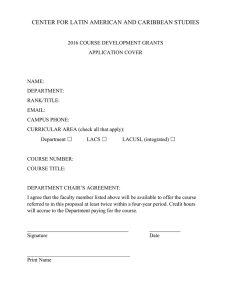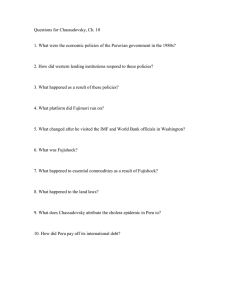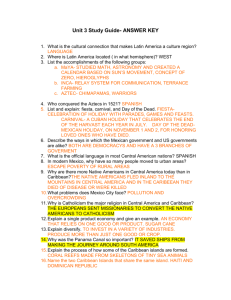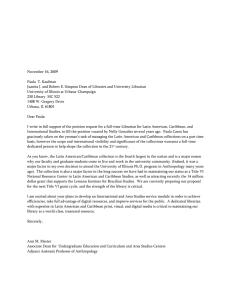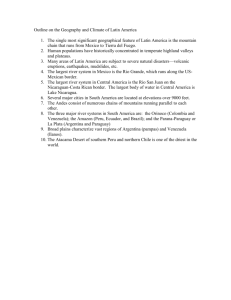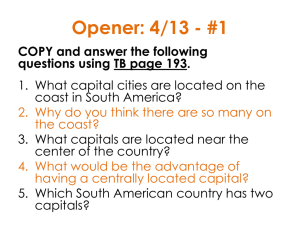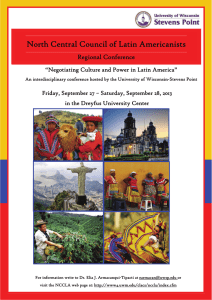Boletin
advertisement
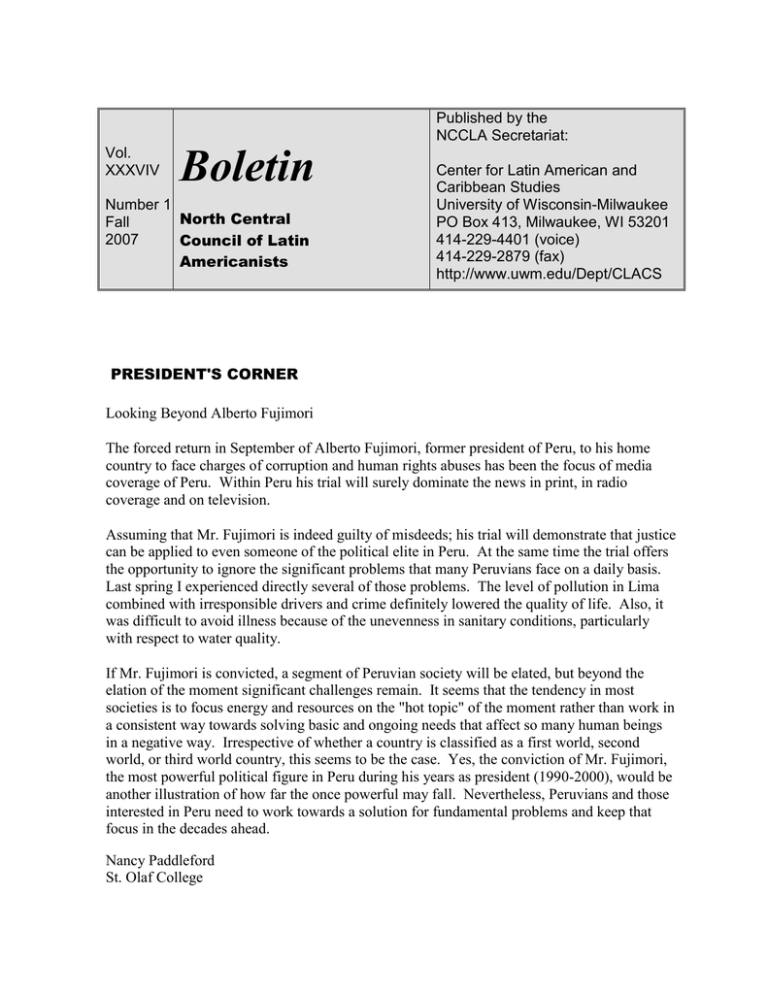
Published by the NCCLA Secretariat: Vol. XXXVIV Boletin Number 1 North Central Fall 2007 Council of Latin Americanists Center for Latin American and Caribbean Studies University of Wisconsin-Milwaukee PO Box 413, Milwaukee, WI 53201 414-229-4401 (voice) 414-229-2879 (fax) http://www.uwm.edu/Dept/CLACS PRESIDENT'S CORNER Looking Beyond Alberto Fujimori The forced return in September of Alberto Fujimori, former president of Peru, to his home country to face charges of corruption and human rights abuses has been the focus of media coverage of Peru. Within Peru his trial will surely dominate the news in print, in radio coverage and on television. Assuming that Mr. Fujimori is indeed guilty of misdeeds; his trial will demonstrate that justice can be applied to even someone of the political elite in Peru. At the same time the trial offers the opportunity to ignore the significant problems that many Peruvians face on a daily basis. Last spring I experienced directly several of those problems. The level of pollution in Lima combined with irresponsible drivers and crime definitely lowered the quality of life. Also, it was difficult to avoid illness because of the unevenness in sanitary conditions, particularly with respect to water quality. If Mr. Fujimori is convicted, a segment of Peruvian society will be elated, but beyond the elation of the moment significant challenges remain. It seems that the tendency in most societies is to focus energy and resources on the "hot topic" of the moment rather than work in a consistent way towards solving basic and ongoing needs that affect so many human beings in a negative way. Irrespective of whether a country is classified as a first world, second world, or third world country, this seems to be the case. Yes, the conviction of Mr. Fujimori, the most powerful political figure in Peru during his years as president (1990-2000), would be another illustration of how far the once powerful may fall. Nevertheless, Peruvians and those interested in Peru need to work towards a solution for fundamental problems and keep that focus in the decades ahead. Nancy Paddleford St. Olaf College 2007-08 NCCLA Executive Committee President: Seth Meisel (History, UW-Whitewater) Vice President/President Elect: Eduardo Magalhães (Political Science, Simpson College) Secretary/Treasurer: Molly Todd (History, Augustana College) Communications & Membership Chair: Elia Armacanqui-Tipacti (Foreign Languages, UW-Stevens Point) Nominations Chair: Don Kuderer (Modern Languages, UW-La Crosse) Program Chair: Lance Grahn (L&S, UW-Stevens Point) Past President: Nancy Paddleford (Music, St. Olaf College) CONFERENCES & CALL FOR PAPERS SYMPOSIUM - The Latin American Studies Program at Grand Valley State University invites abstracts relating to the theme, Persistent Divides: Marginalization and Social Exclusion in Latin America and the Caribbean. Allendale, MI, March 14-15, 2008. Please direct inquiries to: Joel Stillerman, Director, Latin American Studies Program, Grand Valley State University, Phone: 616-331-3129, Email: stillejo@gvsu.edu. CONFERENCE Pacific Coast Council on Latin American Studies (PCCLAS), Latin America: Peoples and Possibilities is a general theme of the 2007 Conference at Claremont McKenna College, Claremont CA, November 2-3, 2007. The conference will bring together scholars, educators, graduate, and undergraduate students and community members interested in Latin American and Latino/a Studies. Papers will be presented from all areas of the social sciences, humanities, and the arts and/or cross-disciplinary studies. Phone: 909-607-0944, Email: pcclas2007@cmc.edu, Website: http://www.pcclas.org. CONFERENCE 51st Annual Missouri Valley History Conference, Embassy Suites Downtown/Old Market, Omaha, Nebraska, March 6-8, 2008. For information contact Dr. Maria S. Arbelaez, Program Chair, Phone: 402-554-3649, 402-554-2794, Email: marbelaez@mail.unomaha.edu CALL FOR PAPERS. The Cuban and Caribbean Studies Institute at Tulane University, in conjunction with the Stone Center for Latin American Studies, is pleased to announce Virtual Caribbeans, to be held in New Orleans, Louisiana February 27 - March 1, 2008. The definition of the Caribbean as primarily a geographical region is no longer viable. Through the movement of its peoples, cultures, and languages, we also make or find the “Caribbean” elsewhere. It has become an imagined community beyond geographic contours, while simultaneously retaining an immediate materiality that impacts the everyday experiences of Caribbean (and non-Caribbean) subjects. Taking the guayabera as the ubiquitous emblem of Caribbeanness, this conference will offer a space for the exploration of manifestations across various media, technologies and performances. Due to a unique history that features French, Spanish, African, Canadian, and other immigrant influences, as well as a legacy of traffic in peoples, cultures, dialects, and products from the West Indies and the circum-Caribbean, New Orleans provides an ideal site for these explorations. Join us in what is often called the northernmost point of the Caribbean. Proposals for papers and panels are invited in a wide range of areas including, but not limited to: * Configurations of the Caribbean in cyberspace * Filmic and other visual Caribbeans * Listening to the Caribbean * Tangible sites of Caribbeannness created through migrations and diaspora communities * Portable Caribbeans * Performance and stagings of the Caribbean inside and outside its geographical confines We invite proposals that examine particular case studies and phenomena or rethink conventional narratives. Proposals for individual papers or 3-4 person panels should include a 300-word abstract and detailed personal information (name, mailing address, email, home/fax, institutional affiliation) for each participant. Panel proposals should also include a separate top sheet identifying the panel title, panel organizer and a 200-300 word panel description. Please email proposals by November 15, 2007 to nporto@tulane.edu. Accepted papers and panels will be announced by December 1, 2007. Further details will be available on line at http://cuba.tulane.edu. Conference Organizers: Prof. Ana M. López, Director Cuban and Caribbean Studies Institute lopez@tulane.edu Prof. Marilyn Miller, Department of Spanish and Portuguese mgmiller@tulane.edu. CALL FOR PAPERS 55th Annual Conference of the Rocky Mountain Council for Latin American Studies, Wednesday, April 9 - Saturday, April 12, 2008, Flagstaff, AZ Description: The RMCLAS Annual Conference provides an opportunity for scholars and graduate students to share original research on Latin America. Proposal deadline: November 15, 2007 For more information contact RMCLAS 2008 web page at http://www.cal.nau.edu/LAS/rmclas.asp. CALL FOR PAPERS Dos siglos de revoluciones en Mexico, September 17-20, 2008, Morelia, Michoacan, Mexico. International Conference about Revolutions in Mexican History. Proposal deadline January 31, 2008. Contact information: www.centenarios.unam.mx FELLOWSHIPS & GRANTS The John Carter Brown Library fellowship program was created to give scholars from this country and abroad an opportunity to pursue their work in proximity to a distinguished collection of primary sources. Approximately twenty-five fellowships are awarded each year for periods of time usually ranging from two to ten months. Fellowships are available for any qualified researcher, the main criteria for appointment being the merit and significance of the candidate’s proposal, the qualifications of the candidate, and the relevance of the project to the holdings of the Library. The fellowship selection committees look closely at the potential shown by the candidate for creative utilization of the Library’s resources. The application deadline for fellowships for 2008-2009 is January 10, 2008. For forms or more information write to: The John Carter Brown Library, Box 1894, Brown University, Providence, RI 02912. Phone: 401-863-2725, Fax: 401-863-3477, Email: JCBL_Fellowships@Brown.edu, Website: http://www.jcbl.org. The Fulbright Teacher Exchange Program of the U.S. Department of State is pleased to provide an opportunity for U.S. middle/high public school principals/assistant principals who have been recognized for their excellence, achievement and/or leadership on a local, regional or national level to learn more about the Brazilian educational system, visit Brazilian schools, and interact with Brazilian administrators, teachers, and students August 2-16, 2008. Awardwinning principals from more than 20 Brazilian states will join U.S. counterparts to share best practices in school leadership and administration, teacher development, and community involvement. Application Deadline: March 15, 2008. **Priority will be given to applicants who file before the final deadline. For more specific information about this program please visit the OTHER OPPORTUNITIES page our website: http://www.fulbrightexchanges.org/View/ViewOtherOpps.asp NEWS FROM MEMBERS Dr. Elia J. Armacanqui-Tipacti (University of Wisconsin-Stevens Point) published “La propia escritura y la re-escritura de un transcriptor en Vida de la Madre María Manuela Ripa”pp. 244-260, Diálogos espiirituales: Manuscritos femeninos hispanoamericanos, siglos XVI-XIX, México, Benemérita Universidad Autónoma Puebla/ Universidad de las Américas Puebla, México, 2006. This is the first article about an unpublished voluminous manuscript written by a Sister Maria Manuela Ripa. The document was found at the Santa Catalina cloister in Arequipa, Peru. The significance of the finding proves that during Colonial times in Peru there were many manuscripts written by nuns. Moreover, it is important to uncover these valuable documents because the contemporary readers can find out not only nuns' spiritual life but also the culture and history during their period narrated by women. The most important fact is that women also were writers. Dr. Daniel Breining (University of Wisconsin-Stevens Point). During his sabbatical of fall 2006 in Mexico, Associate Professor of Spanish Daniel Breining was able to finish his second book Mexican Theater and Drama From the Conquest Through the Seventeenth Century (Lewiston, NY: Edwin Mellen P, 2007). The remainder of his sabbatical was dedicated to research on his third book, Western Cultural Semiotics of Modern Latin American Theater and Drama, which hopefully will be published in the next few years. During Professor Breining’s stay in Mexico he presented his research to the students and faculty of the Universidad Nacional Autónoma de México, “Tenochtitlán después de la conquista: el teatro de conversión.” In addition, he offered new information regarding semiotics and colonial Mexican theater at the Letters & Sciences Humanities Forum at the University of WisconsinStevens Point through the presentation “Theater, Semiotics, and Colonial Mexico.” Send News From Members for Winter 2007 issue to Elia J. Armacanqui-Tipacti Elia.Armacanqui-Tipacti@uwsp.edu BOOKS & PUBLICATIONS Cultural Memory: Resistance, Faith, and Identity by Jeanette Rodriguez and Ted Fortier The common "blood" of a people—that imperceptible flow that binds neighbor to neighbor and generation to generation—derives much of its strength from cultural memory. Cultural memories are those transformative historical experiences that define a culture, even as time passes and it adapts to new influences. For oppressed peoples, cultural memory engenders the spirit of resistance; not surprisingly, some of its most powerful incarnations are rooted in religion. In this interdisciplinary examination, Jeanette Rodriguez and Ted Fortier explore how four such forms of cultural memory have preserved the spirit of a particular people. Cultural Memory is a multicultural work, with four distinct case studies: the image of Our Lady of Guadalupe and the devotion it inspires among Mexican Americans; the role of secrecy and ceremony among the Yaqui Indians of Arizona; the evolving narrative of Archbishop Oscar Romero of San Salvador as transmitted through the church of the poor and the martyrs; and the syncretism of Catholic Tzeltal Mayans of Chiapas, Mexico. This landmark work in cultural studies is a conversation between a liberation theologian and a cultural anthropologist on the religious nature of cultural memory and the power it brings to those who wield it. ISBN: 978-0-292-71663-6, $45.00, hardcover, no dust jacket ISBN: 978-0-292-71664-3, $16.95, paperback Web Special: $11.36 The University of Texas Press, P.O. Box 7819, Austin, TX 78713, Tel: 1-800-252-3206 or FAX: 1-800-687-6046, Website: www.utexas.edu/utpress/. The Potbellied Virgin by Alicia Yáñez Cossío translated by Amalia Gladhart A delightfully witty depiction of a community in the central Andes, documenting political history from the late nineteenth century through the 1960s. Yáñez Cossío’s wry turns of phrase, narrative that flows at a clip, and characters who represent stark differences in socioeconomic levels distinguish her body of work. The Benavides clan, which has ruled ever since, represents the arch-conservative element of Ecuadorian political history. Their elite status is preserved through the actions of the women in the Sisterhood of the Bead on the Gown of the Potbellied Virgin, a small, secretive group of matrons. The Sisterhood has assigned itself the responsibility for the icon – and thus, the moral and religious control of the town. ISBN: $45.00, hardcover, no dust jacket ISBN: $16.95, paperback Web Special: $11.36 The University of Texas Press, P.O. Box 7819, Austin, TX 78713, Tel: 1-800-252-3206 or FAX: 1-800-687-6046, Website: www.utexas.edu/utpress/. Hugo Chavez: Oil, Politics, and the Challenge to the U.S. by Nikolas Kozloff Audacious, provocative, and bombastic, few world politicians are as colorful as Hugo Chávez, now making international news for his plans to nationalize U.S. owned businesses and his bold opposition to Washington's economic and trade policies. As Venezuela gains importance as the fifth largest oil exporter in the world, this firebrand leader is quickly moving to the public spotlight by uniting much of South America against the Bush administration and wielding oil as a "geopolitical weapon." To create this rich and objective portrait, Nikolas Kozloff--one of the few American journalists who has spent years in the Andean region--has profiled Chávez's top advisors, leaders of his movement, and other key figures in both Venezuela and the U.S. The result is a timely, exhaustive analysis of Chávez as a political leader, and a nuanced examination of the president moving to the center of the global stage. Includes a new afterword by the author, with insights into Chávez's reelection in relation to wider hemispheric politics. ISBN 1-4039-7315-6 $27.95, hardcover ISBN 1-4039-8409-3 $14.95, paperback Palgrave Macmillan, 175 Fifth Avenue, New York, NY 10010, Tel: 1 (888) 330-8477 Fax: 1 (800) 672-2054, Website: http://www.palgrave-usa.com/
